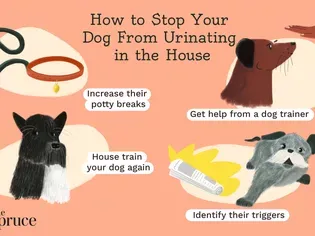Why Do Dogs Pee in the House and 6 Proven Ways to Stop It
Updated on 05/27/24

Unleashing the Secrets: Why Do Dogs Pee in the House and 6 Potent Solutions to End the Mess
As devoted dog owners, we shower our furry companions with love and affection. However, one common issue that can test our patience and stain our carpets is house soiling. Understanding the underlying reasons for this behavior is crucial to effectively address it.
Deciphering the Canine Mind: Why Do Dogs Defecate Inside?
* Medical Conditions: Urinary tract infections, kidney disease, and bladder stones can cause increased urination and difficulty holding it in. If you suspect a medical issue, consult your veterinarian promptly.
* Anxiety or Stress: Dogs can resort to inappropriate elimination when feeling anxious or stressed. Changes in routine, separation anxiety, or loud noises can trigger this behavior.
* Lack of House Training: Young puppies or dogs adopted from shelters may not have received proper house training. Consistent training and positive reinforcement are essential.
* Marking Territory: Intact male dogs often urinate to mark their territory. Spaying or neutering can significantly reduce this behavior.
* Submissive Urination: Submissive dogs may urinate when approached by dominant humans or other animals. Avoid punishing this behavior, as it can worsen anxiety.
* Cognitive Decline: Senior dogs may experience cognitive impairment, leading to confusion and difficulty controlling their elimination.
6 Proven Strategies to Curb House Soiling
1. Establish a Regular Routine:
Dogs thrive on routine. Designate specific times for feeding, walking, and going to the bathroom. Stick to this schedule as much as possible to help your dog develop regular elimination habits.
2. Crate Training with Positive Reinforcement:
Crates provide a safe and confined space for dogs, reducing the likelihood of accidents. Start by introducing your dog to the crate gradually, using treats and praise. Associate the crate with positive experiences to foster a sense of comfort.
3. Supervise and Reward:
Keep an eye on your dog, especially after meals, naps, and playtimes. When they signal the need to go outside, take them immediately to their designated potty area. Reward them profusely with treats and praise for appropriate elimination.
4. Clean Accidents Thoroughly:
Accidents happen, but it's crucial to clean them up properly. Use an enzymatic cleaner specifically designed to eliminate pet odors. Avoid using ammonia-based cleaners, as these can attract dogs back to the same spot.
5. Address Anxiety and Stress:
If you suspect anxiety is the underlying cause, identify and address the triggers. Consider behavioral modification techniques, such as desensitization and counter-conditioning, to reduce anxiety. Pheromone diffusers or calming supplements may also provide relief.
6. Consult a Professional:
If all else fails, don't hesitate to seek professional help from a veterinarian or certified animal behaviorist. They can assess your dog's physical and mental health, provide personalized training plans, and recommend medications if necessary.
Additional Tips for Success:
* Use a black light to detect hidden stains and clean them thoroughly.
* Place absorbent pads in areas where your dog tends to have accidents.
* If your dog has a long-standing history of house soiling, consider hiring a professional pet cleaner to eliminate lingering odors.
* Be patient and consistent with your training. House training takes time and effort, but with determination and the right approach, you can help your furry friend overcome this issue and maintain a clean and harmonious home environment.
Remember, house soiling is not a punishment or a reflection of your dog's character. By understanding the reasons behind it and implementing the proven strategies outlined above, you can effectively resolve this issue and restore balance to your pet's behavior and your home's cleanliness.
Explore More Pets

Basic Training
Puppy and Baby Introductions

Working Dog Breeds
All About Search and Rescue Dogs

Dog Treatments
Puppy Vaginitis: Signs, Causes and Treatment

Dog Adoption
After More Than 1,200 Days in the Shelter, Coco Goes Home

Basic Training
How to Train Your Puppy to Go on Potty Pads

Hybrid Dog Breeds
The Difference Between a Mutt, Mixed Breed, or Designer Dog?

Dog Treatments
Nail Problems in Dogs

Puppies
7 Reasons Why Two Dogs Are Better Than One
